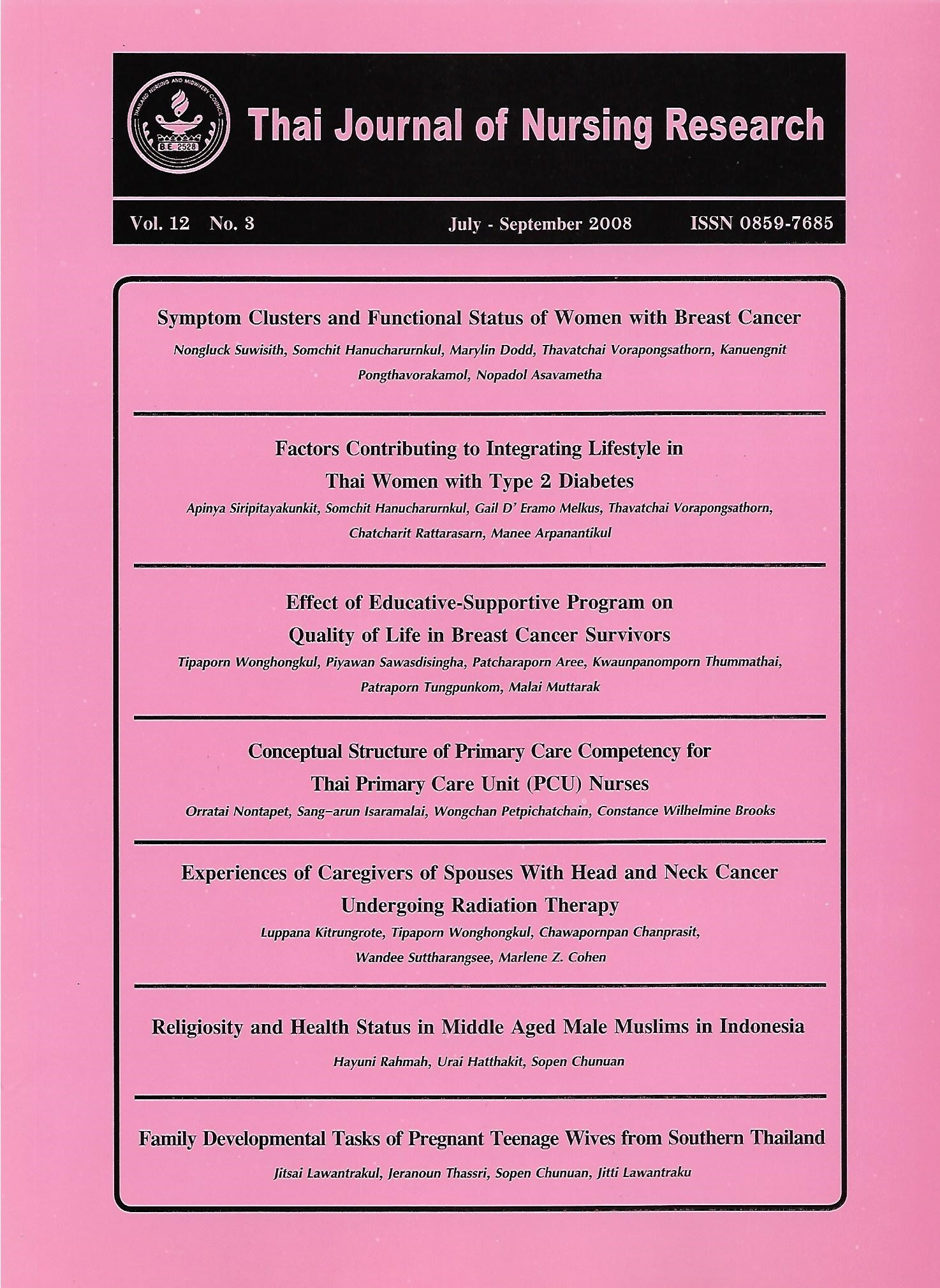Factors Contributing to Integrating Lifestyle in Thai Women with Type 2 Diabetes
Keywords:
การปรับแบบแผนการดำเนินชีวิต, เบาหวานชนิดที่ 2, ผู้หญิงAbstract
บทคัดย่อ
โรคเบาหวานเป็นปัญหาสุขภาพเรื้อรังที่สำคัญของประเทศไทย การปรับเปลี่ยนแบบแผนการดำเนินชีวิตในผู้ป่วยเบาหวานมีความสำคัญในการช่วยลดการเกิดภาวะแทรกซ้อน อย่างไรก็ตามการปรับเปลี่ยนแบบแผนการดำเนิน ชีวิตโดยเฉพาะในผู้หญิงต้องใช้เวลาและใช้ความพยายามเป็นอย่างมาก เนื่องจากผู้หญิงมีหน้าที่ดูแลความเป็นอยู่ของบุคคล ในครอบครัวและบางคนต้องทำงานนอกบ้าน การทำบทบาทหน้าที่หลายอย่างย่อมทำให้มีความยากลำบากเพิ่มมากขึ้น ในการปรับแบบแผนการดำเนินชีวิต ดังนั้นความรู้เกี่ยวกับปัจจัยต่างๆ ที่จะช่วยส่งเสริมให้ผู้ที่เป็นเบาหวานสามารถปรับ แบบแผนการดำเนินชีวิตจึงมีความจำเป็น การศึกษานี้จึงมีวัตถุประสงค์เพื่อศึกษาความสัมพันธ์เชิงสาเหตุระหว่างปัจจัยด้านบุคคล ด้านการสนับสนุนทางสังคมจากครอบครัวและเพื่อน ตลอดจนปัจจัยทางด้านระบบสุขภาพกับการปรับแบบ แผนในการดำเนินชีวิตของหญิงไทยที่เป็นเบาหวาน โดยใช้ทฤษฏีการปรับตัวของรอยเป็นกรอบแนวคิดในการศึกษา ผู้หญิง ที่เป็นเบาหวานชนิดที่ 2 จำนวน 490 คน ที่มารับการรักษาในโรงพยาบาล 3 แห่งในกรุงเทพมหานครและมีคุณสมบัติตามเกณฑ์ที่กำหนดตอบแบบสอบถาม 5 ชุด ได้แก่ แบบสอบถามปัญหาที่เกิดจากการดูแลเบาหวาน แบบวัดการรับรู้พฤติกรรมสนับสนุนการดูแลเบาหวานจากครอบครัวและเพื่อน แบบวัดคุณภาพความสัมพันธ์ระหว่างผู้ป่วยและบุคลากร ในทีมสุขภาพ และแบบวัดการรับรู้การปรับแบบแผนการดำเนินชีวิตกับเบาหวาน ผลการศึกษาพบว่าปัจจัยด้านบุคคล การสนับสนุนการดูแลเบาหวานจากครอบครัวและเพื่อน คุณภาพความสัมพันธ์ระหว่างผู้ป่วยและบุคลากรในทีมสุขภาพ ปัญหาที่เกิดจากการดูแลเบาหวาน สามารถทำนายความแปรปรวนของการรับรู้การปรับแบบแผนการดำเนินชีวิตกับเบาหวานได้ร้อยละ 43 รูปแบบจำลองสุดท้ายที่ได้รับการปรับแก้ มีความสอดคล้องกับข้อมูลเชิงประจักษ์ (2= 46, df = 28, p = .017, RMSEA = .036, GFI = .99, CFI = .99, 2/df = 1.64) รายได้ครอบครัว การสนับสนุนการดูแลเบาหวาน จากครอบครัว คุณภาพความสัมพันธ์ระหว่างผู้ป่วยและบุคลากรในทีมสุขภาพ มีอิทธิพลโดยตรงทางบวกต่อการปรับแบบแผนการดำเนินชีวิตกับเบาหวาน ( = 1.65, p < .05), ( = .52, p < .05) และ ( = .46, p < .001) ตามลำดับ ปัญหาในการดูแลเบาหวานและระดับการศึกษามีอิทธิพลโดยตรงทางลบต่อการปรับแบบแผนการดำเนินชีวิตกับ เบาหวาน ( = -.17, p < .01) และ (= -.09, p < .01) ผลการศึกษาชี้ให้เห็นว่ารูปแบบจำลองที่เสนอสามารถ ทำนายการปรับแบบแผนการดำเนินชีวิตได้ บุคลากรในทีมสุขภาพควรตระหนักถึงปัจจัยที่มีผลต่อต่อการปรับแบบแผน การดำเนินชีวิต เพื่อเป็นแนวทางในการส่งเสริมให้ผู้ที่เป็นเบาหวานสามารถอยู่กับโรคเบาหวานได้ดีที่สุด
คำสำคัญ: การปรับแบบแผนการดำเนินชีวิต เบาหวานชนิดที่ 2 ผู้หญิง
Abstract
Type 2 diabetes mellitus has become a major chronic health problem in Thailand. Lifestyle change is necessary to prevent diabetes complications. However, making existing lifestyle changes is difficult, with time and effort required especially in women. To promote integrating lifestyle, knowledge about factors influence integrating lifestyle is needed. Thus, the purpose of this study was to examine the causal relationships among personal, psychological and health care system factors that contribute to integrating lifestyle in Thai women with type 2 diabetes. The Roy Adaptation Model provided the theoretical framework for this study. A total of 490 women with type 2 diabetes from three hospitals in Bangkok participated in this study. Participants were asked to complete 5 questionnaires: the Problems Areas In Diabetes, the Modified Diabetes Family Behavior Checklist-II, the Modified Diabetes Social Support Questionnaire-Friends version, the Modified Patient Reactions Assessment, and the Diabetes Questionnaires. The results showed that 43% of total variance in integrating lifestyle was explained by the proposed model. The relationship among 7 variables were tested and the final model did fit the data well (2 = 46, df = 28, p = .017, RMSEA = .036, GFI= .99, CFI = .99, 2/df = 1.64). Income had the strongest positive direct effect ( = 1.65, p < .05), followed by family support had the second-largest positive direct effect ( = .52, p < .05), and quality of patient-provider relationships had the third direct positive effect on perceived integrating lifestyle ( = .46, p < .001). Demands of diabetes and education had negative direct effects on perceived integrating lifestyle (= -.17 and = -.09, p < .01). These findings indicate that the proposed model can explain and predict integrating lifestyle in Thai women with type 2 diabetes and provide options for better intervention with individuals with diabetes. Health care providers should consider social context factors that influence integrating lifestyle in order to promote sustainable integrating lifestyle.
Keywords: Integrating lifestyle, Type 2 diabetes mellitus, women
Downloads
How to Cite
Issue
Section
License
Copyright: The Pacific Rim International Journal of Nursing Research, Thailand Nursing & Midwifery Council has exclusive rights to publish, reproduce and distribute the manuscript and all contents therein.








.png)



